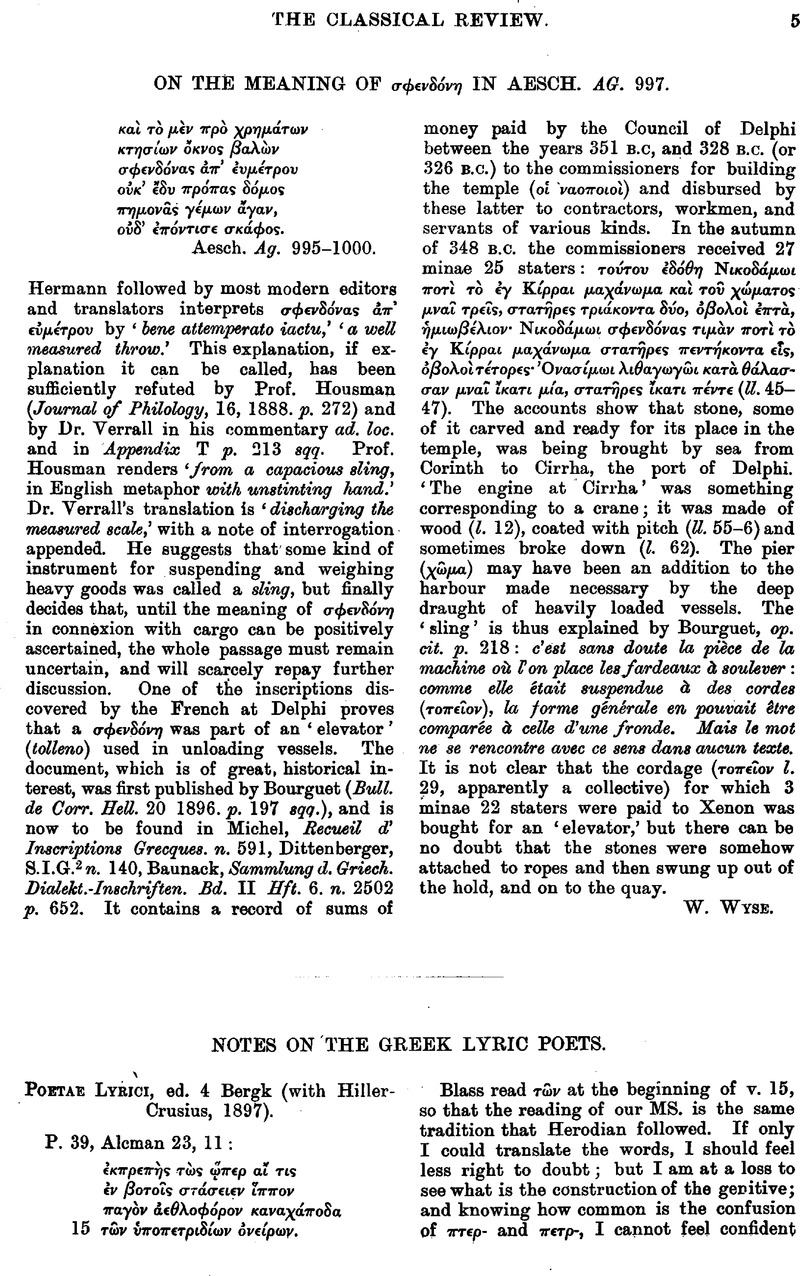No CrossRef data available.
Published online by Cambridge University Press: 27 October 2009

page 6 note 1 Stob. Flor. 3. 79, 80.
page 7 note 1 Stob. Ecl. Phys. i.
page 7 note 2 Whence the precepts of Polonius are in part derived.
page 7 note 3 Stob, Ecl. Phys. i.
page 8 note 1 Lobeek, Parall. p. 337Google Scholar, ‘vulgo autem ⋯κτ⋯…cui tonosi convenit adjectivum ἄκτινος, quod ⋯κτ⋯ῑνος seribendum erat ut ἰτ⋯ῑνος, πτελ⋯ῑνος, πτελ⋯ῑνος, si ab ⋯κτ⋯α sive ⋯κτ⋯ duceretur; quanquam λε⋯κινος apud Hesychium legitur s. Μαδχαλ⋯ν et saepius κρ⋯νινος v. Tzschuck. ad Strab. xii. 197. pro λευκ⋯ῑνος, κραν⋯ῑνος’. See also Phryn. p. 262. In the Thesaurus I have failed to find the adjective.
page 9 note 1 Apollo (Μονσαγ⋯τς) is leader of song, as Dionysus of revels, Pan of hunting ; ![]() Pind. N. V. 23, φοῖβος ⋯γ⋯τωρνελ⋯ων Eur. Med. 425. Hence I think may be emended Aesch. Theb. 131
Pind. N. V. 23, φοῖβος ⋯γ⋯τωρνελ⋯ων Eur. Med. 425. Hence I think may be emended Aesch. Theb. 131 ![]() (for vv. ll. ⋯ντ⋯ς, ⋯ῑτ⋯ς) ‘show thyself to the foe Destroyer, and Leader—of lamentations.’ Cf. Shes. 227.
(for vv. ll. ⋯ντ⋯ς, ⋯ῑτ⋯ς) ‘show thyself to the foe Destroyer, and Leader—of lamentations.’ Cf. Shes. 227.
page 11 note 1 Hermathena, xxv, p. 357.
page 11 note 2 Hence in Eur. fr. 183 (Plat. Gorg. 484 E) the right reading is ![]()
page 12 note 1 Dionys. Perieg. 654 sqq. with Eustath., Quint, 55, 461, 560, Instin. ii. 4.
page 13 note 1 Compare however the remarkable expression in Pind. N. ii. 14 ![]() .
.
page 13 note 2 I see now this has already been adduced by Prof. Wilamowite-Moellendorff.
page 14 note 1 Dionys. Perieg. applies the epithet to the rich water of the fattening Nile, 221 ![]() , 227
, 227 ![]() but that (as the schol. observes) is a synonym of λιπαωτ⋯του, as 824
but that (as the schol. observes) is a synonym of λιπαωτ⋯του, as 824 ![]() Aesch. Supp. 1039, and the difference will, I think, be felt; Nile-water may have body in it, hardly the unsubstantial Zephyr.
Aesch. Supp. 1039, and the difference will, I think, be felt; Nile-water may have body in it, hardly the unsubstantial Zephyr.